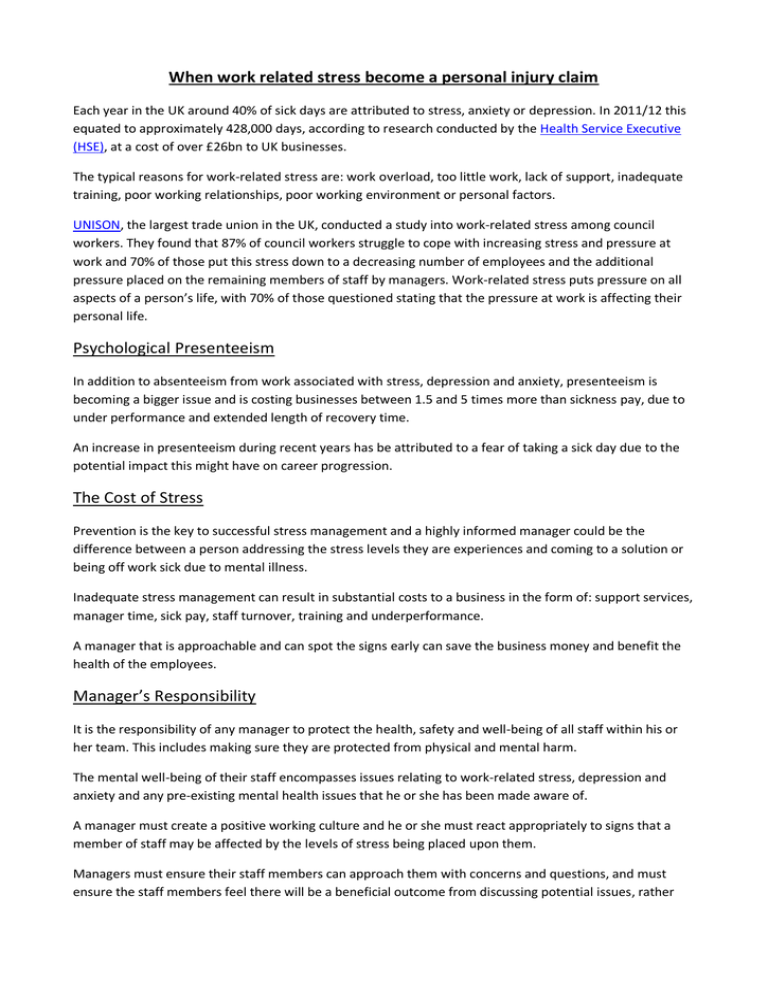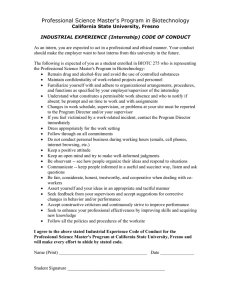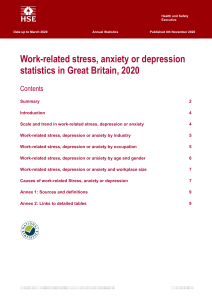When work-related stress becomes a personal injury claim
advertisement

When work related stress become a personal injury claim Each year in the UK around 40% of sick days are attributed to stress, anxiety or depression. In 2011/12 this equated to approximately 428,000 days, according to research conducted by the Health Service Executive (HSE), at a cost of over £26bn to UK businesses. The typical reasons for work-related stress are: work overload, too little work, lack of support, inadequate training, poor working relationships, poor working environment or personal factors. UNISON, the largest trade union in the UK, conducted a study into work-related stress among council workers. They found that 87% of council workers struggle to cope with increasing stress and pressure at work and 70% of those put this stress down to a decreasing number of employees and the additional pressure placed on the remaining members of staff by managers. Work-related stress puts pressure on all aspects of a person’s life, with 70% of those questioned stating that the pressure at work is affecting their personal life. Psychological Presenteeism In addition to absenteeism from work associated with stress, depression and anxiety, presenteeism is becoming a bigger issue and is costing businesses between 1.5 and 5 times more than sickness pay, due to under performance and extended length of recovery time. An increase in presenteeism during recent years has be attributed to a fear of taking a sick day due to the potential impact this might have on career progression. The Cost of Stress Prevention is the key to successful stress management and a highly informed manager could be the difference between a person addressing the stress levels they are experiences and coming to a solution or being off work sick due to mental illness. Inadequate stress management can result in substantial costs to a business in the form of: support services, manager time, sick pay, staff turnover, training and underperformance. A manager that is approachable and can spot the signs early can save the business money and benefit the health of the employees. Manager’s Responsibility It is the responsibility of any manager to protect the health, safety and well-being of all staff within his or her team. This includes making sure they are protected from physical and mental harm. The mental well-being of their staff encompasses issues relating to work-related stress, depression and anxiety and any pre-existing mental health issues that he or she has been made aware of. A manager must create a positive working culture and he or she must react appropriately to signs that a member of staff may be affected by the levels of stress being placed upon them. Managers must ensure their staff members can approach them with concerns and questions, and must ensure the staff members feel there will be a beneficial outcome from discussing potential issues, rather than a negative impact on their working conditions as a result of highlighting a potential issue. The MINDFUL EMPLOYER Line Managers’ Resource provides valuable information and advice on having such conversations. The stigma attached to mental health has resulted in the majority of people not bringing to light potential health issues at the earliest sign of a problem. Employee’s responsibility Each member of staff has a responsibility to be open and honest with their manager with regards to their health and well-being when it relates to work but this is difficult if the manager does not appear approachable. In situations where pressure at work has the potential to turn into work-related stress, it is vital that the manager is made aware that the workload, deadlines, working environment etc., is not sustainable, so that adaptions can be made to improve the situation before it has a more severe impact of the health of the employee. The employee must bring these issues to the manager as he or she is only legally bound to take things at face value. When asked “Is everything ok?” and the staff member responds with “yes everything is fine”, then the manager is not obligated to take action to improve the situation. When work-related stress becomes a Personal injury claim The possibility of a personal injury claim may arise from the duty of care that employers and managers have to provide a safe environment at work. If an employee suffers a recognised psychiatric illness, such as clinical depression caused by stress at work with no outside factors contributing to the illness, and the manager knew about the worsening of the condition and did not act, there is the possibility of a personal injury claim. It is important that any issues relating to stress, depression and anxiety are brought to the manager’s attention so that these can be rectified before they have a more serious effect on the health of the staff member. With regards to a personal injury case; the employer or manager is only responsible for what he or she is deemed to have been aware of. An employer will assume that a member of staff can withstand the normal pressures of the job and is permitted to accept what he or she is told by a member of staff at face value which is why it is important to be open and honest about any issues relating to mental health. A positive working culture ensures that staff members feel like they can approach their manager and discuss potential issues, and together a plan can be made to prevent healthy levels of pressure become work-related stress. As stated before, prevention is the key to successful stress management and training is important to ensure that managers have the skills required to spot the signs and implement an adequate stress management process before it becomes an issue. By equipping both managers and employees with the necessary skills and knowledge, the potential losses to businesses can be lessened. Any questions on mental health and the law contact us. This article was written by Vicki Power. Vicki studied Business and Psychology at Northern Arizona University and writes passionately about both topics.


